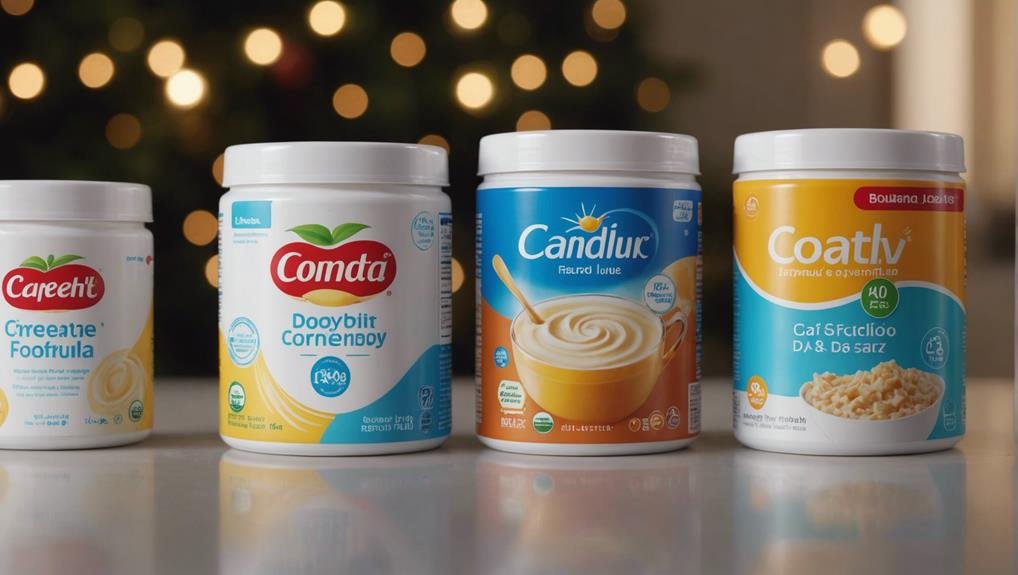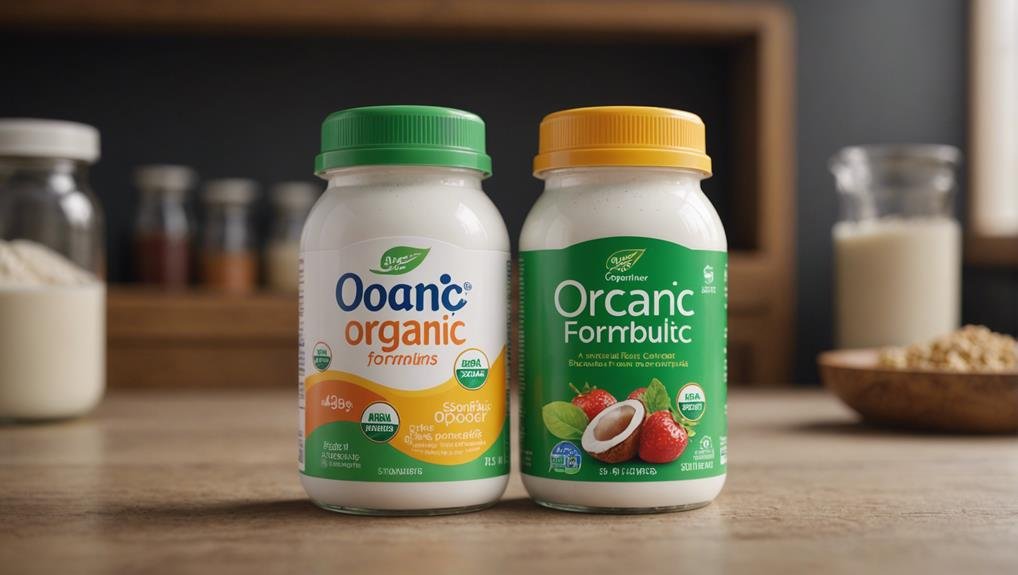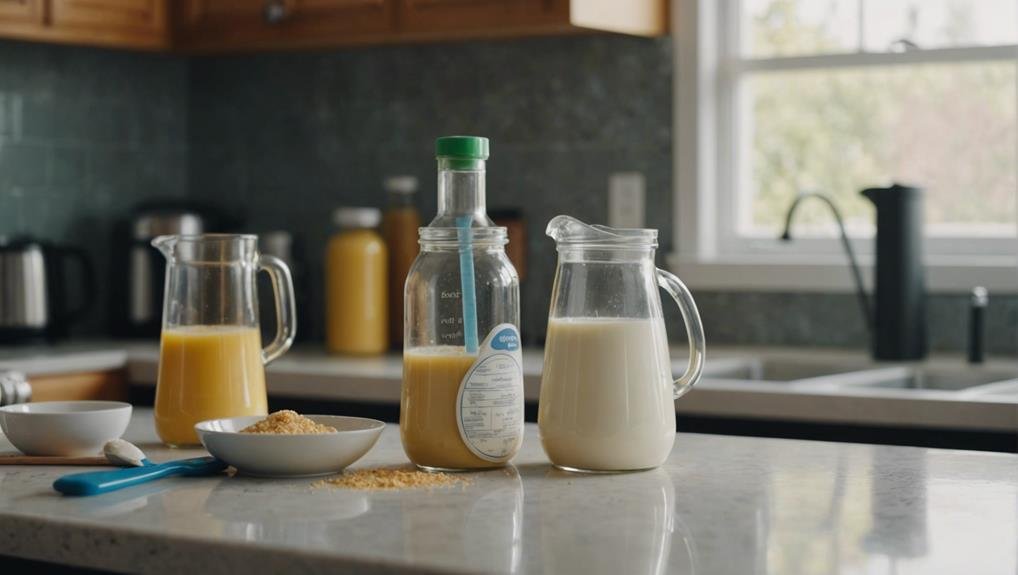"Cherishing Little Steps - A Haven for Baby and Family Journeys"
Baby Formula
If you've ever found yourself contemplating the world of baby formula while wandering the aisles of your local grocery store, you're not alone. The array of options can be overwhelming, but fear not, as understanding the nuances of baby formula is crucial in providing your little one with the best start in life. From deciphering ingredient labels to navigating specialized formulas for specific needs, there's a lot to consider when it comes to ensuring your baby's nutritional needs are met. Stay tuned to uncover the essential aspects of selecting and preparing baby formula to support your baby's healthy development.
Types of Baby Formula

When choosing baby formula, it's important to consider the different types available to meet your infant's specific nutritional needs. Formula options range from cow's milk-based to soy-based and specialized formulas for unique dietary requirements. Cow's milk-based formulas are the most commonly used and mimic breast milk closely in terms of nutrients. They're suitable for most babies unless there are specific allergies or sensitivities.
Soy-based formulas are an option for babies with lactose intolerance or milk protein allergies. Specialized formulas cater to infants with reflux, colic, or other digestive issues.
When comparing brands, look at the nutritional benefits each offers. Some brands may have added probiotics, DHA, or prebiotics, which can support your baby's development. However, these additional ingredients might come at a higher price point, so budget considerations are essential.
It's crucial to strike a balance between finding a formula that provides the necessary nutrients for your baby's growth while also fitting within your budget constraints. Conducting brand comparisons and carefully reading labels can help you make an informed decision that prioritizes both your infant's health and your financial well-being.
Key Ingredients to Consider
Consider key ingredients in baby formula to ensure you're providing essential nutrients for your infant's growth and development. When choosing a formula, prioritize nutritional balance for your baby's well-being. Look for ingredients like proteins, carbohydrates, fats, vitamins, and minerals that mimic breast milk to support healthy growth.
Ensuring your baby's digestive comfort is crucial; opt for formulas with easy-to-digest proteins and prebiotics that promote a healthy gut.
While health benefits are paramount, it's also important to consider price comparison. Some formulas may offer similar nutritional content at a more affordable price point, helping you provide for your baby's needs without breaking the bank. However, always consult with your pediatrician before making any decisions to ensure the formula meets your baby's specific dietary requirements.
Organic Vs. Non-Organic Options

Choosing between organic and non-organic baby formulas involves considering the sourcing and production methods of the ingredients used in each formula. When it comes to nutritional benefits, organic baby formulas are often perceived as a healthier choice due to their strict regulations on ingredients. Organic formulas are free from synthetic pesticides, antibiotics, and growth hormones, offering a more natural option for your little one's delicate digestive system.
On the other hand, non-organic formulas may contain ingredients that have been exposed to pesticides and other chemicals during production.
In terms of environmental impact, organic baby formulas are generally more sustainable. Organic farming practices prioritize soil health, biodiversity, and reducing pollution, which can have a positive effect on the environment in the long run. By choosing organic formulas, you're supporting eco-friendly practices that benefit the planet.
Non-organic formulas, while meeting regulatory standards, may contribute to environmental degradation through the use of synthetic chemicals in agriculture. When deciding between organic and non-organic options, consider not only the nutritional benefits for your baby but also the environmental impact of your choice.
Specialized Formulas for Specific Needs
Specialized formulas tailored to meet specific nutritional needs are available for infants with unique dietary requirements. Understanding the nutritional requirements of your baby is crucial, especially if they've digestive issues that may require a specialized formula.
Infants with conditions like lactose intolerance or cow's milk protein allergy may benefit from formulas that are designed to address these specific needs. For babies with lactose intolerance, lactose-free formulas can provide the necessary nutrients without causing digestive discomfort. These formulas still offer essential vitamins, minerals, and proteins crucial for your baby's growth and development.
On the other hand, for infants with cow's milk protein allergy, hydrolyzed protein formulas break down proteins into smaller, more manageable parts, reducing the likelihood of an allergic reaction while ensuring proper nutrition.
Consulting with a healthcare provider is vital to determine the best specialized formula for your baby based on their individual nutritional requirements and digestive issues. By addressing these specific needs early on, you can help your infant thrive and stay healthy.
Mixing and Preparing Formula

When mixing and preparing formula for your baby, it's important to follow proper guidelines to ensure their nutritional needs are met safely and effectively. Start by sterilizing all equipment such as bottles, nipples, and mixing utensils before each use. This helps prevent harmful bacteria from contaminating the formula.
Always measure the formula accurately according to the instructions provided on the packaging to maintain the correct balance of nutrients for your baby's growth and development.
Pay attention to the water temperature when preparing the formula. It's recommended to use water that's at a specific temperature as indicated on the formula packaging or by healthcare professionals. This ensures that the formula mixes well and any harmful bacteria present in the powder are eliminated.
Establishing a feeding schedule that works for both you and your baby is crucial. Consistency in feeding times helps regulate your baby's digestion and allows you to monitor their intake effectively.
Storage and Handling Guidelines
Proper storage and handling of baby formula are crucial to maintain its quality and safety for your infant. Ensuring that you follow the recommended guidelines for formula expiration dates, proper storage, and safe handling practices is essential for your baby's well-being. Here are some key tips to help you keep your baby's formula fresh and safe:
| Formula Expiration | Proper Storage | Safe Handling Practices |
|---|---|---|
| Check expiration dates on the formula packaging | Store formula in a cool, dry place away from direct sunlight | Wash your hands thoroughly before preparing formula |
| Do not use formula past the expiration date | Keep opened formula canisters tightly sealed | Use clean bottles and utensils for mixing formula |
| Avoid buying formula nearing its expiration date | Do not store formula near strong-smelling foods | Follow proper mixing instructions to ensure correct nutrition |
Transitioning Between Formulas

Wondering how to smoothly transition between different baby formulas for your infant's well-being? When switching formulas, consider factors like formula consistency, taste preferences, nutritional content, and potential digestive issues.
Start by gradually introducing the new formula while slowly phasing out the old one. This approach helps your baby adjust to the new taste and minimizes digestive disruptions.
Formula consistency plays a crucial role in transitioning between formulas. Stick to formulas with similar textures and thickness to reduce the chances of digestive discomfort. Additionally, pay attention to your baby's taste preferences. Some infants may have specific tastes, so experimenting with different formulas can help find the right fit.
Nutritional content is another essential aspect to consider. Ensure that the new formula meets your baby's nutritional needs and is suitable for their age. If your infant experiences digestive issues during the transition, consult with your pediatrician to address any concerns promptly.
Common Feeding Concerns
Addressing common feeding concerns is essential for ensuring your baby's nutritional health and well-being. When it comes to feeding schedules, it's crucial to listen to your baby's cues and establish a routine that works for both of you.
Digestive issues like gas or constipation can be common, but if they persist, consulting with a healthcare provider is important to rule out any underlying problems.
During growth spurts, your baby may seem hungrier than usual, leading to increased formula intake. It's essential to respond to their needs during these periods to support their development adequately.
Introducing solids is another milestone in your baby's feeding journey. It's recommended to start around six months, following your healthcare provider's guidance to ensure a smooth transition and balanced nutrition.
Selecting the Right Bottle
Choosing the appropriate bottle for feeding your baby is crucial for their comfort and ease of feeding. When selecting a bottle, consider the shape of the bottle and the nipple flow.
Bottle shapes vary from standard straight bottles to angled or wide-neck options. Wide-neck bottles are easier to clean and can mimic the breast, which may help babies transition between breastfeeding and bottle-feeding. Angled bottles can reduce the amount of air your baby swallows, potentially decreasing gas and discomfort.
Nipple flow is another important factor to consider. Nipples come in different flow rates, typically slow, medium, and fast. Newborns usually start with slow-flow nipples to prevent choking and overfeeding. As your baby grows and becomes more skilled at feeding, you can gradually switch to faster flow nipples.
It's essential to monitor your baby's feeding cues and adjust the nipple flow accordingly to ensure they're feeding comfortably and efficiently. Remember, every baby is different, so you may need to try a few options before finding the perfect bottle for your little one.
Choosing Formula for Allergies
To address allergies in infants, selecting the right formula is vital for their health and well-being. If your little one shows signs of allergies, allergy testing can help identify specific triggers. Pediatrician recommendations are crucial in this process, guiding you towards hypoallergenic options that are gentle on your baby's system.
When choosing a formula for allergies, consider alternative formulas designed for infants with sensitivities. These formulas are often hydrolyzed or elemental, meaning the proteins are broken down into smaller, less allergenic parts. They can be easier for babies to digest and less likely to trigger allergic reactions.
It's essential to work closely with your healthcare provider to monitor your baby's response to the new formula. They can provide guidance on the best approach and ensure your little one is getting the nutrients they need while avoiding allergens.
Frequently Asked Questions
Can Baby Formula Be Used Past the Expiration Date?
You should not use any product past its expiration date. Always follow guidelines for formula storage and proper disposal. It's crucial for your baby's health and safety. Check the label and discard expired formula responsibly.
Are There Any Risks Associated With Switching Formulas Frequently?
Switching formulas frequently can disrupt formula stability and nutrient balance, potentially causing digestive issues for your little one. Consistency is key in providing the best nourishment. Stick to one formula unless advised otherwise.
How Do I Know if My Baby Is Allergic to a Specific Formula?
To determine if your baby is allergic to a specific formula, observe for allergy symptoms like rash, vomiting, or diarrhea. Consult a pediatrician to discuss testing. Consider alternative formulas with similar nutrition if needed for your baby's well-being.
What Is the Recommended Water Temperature for Formula Preparation?
To prepare formula properly, recommended water temperature is between 158-176°F. Store formula in a cool, dry place. Sterilize bottles before each use to prevent contamination. Follow these steps for safe feeding practices.
Can Leftover Formula Be Reheated and Given to the Baby Later?
Like a gentle dance, consider formula storage guidelines. Reheating tips ensure safety. Never reuse unfinished formula; discard after feeding. Explore alternative feeding methods and adhere to feeding schedules for your baby's well-being.
Conclusion
In conclusion, choosing the right baby formula is essential for your little one's health and development. Remember to consult with a pediatrician to select the best option based on your baby's needs.
Just as a skilled artist carefully selects the right colors to create a masterpiece, you can carefully choose the perfect formula to nourish your baby and support their growth. Trust in the process and enjoy watching your baby thrive with the proper nutrition.




